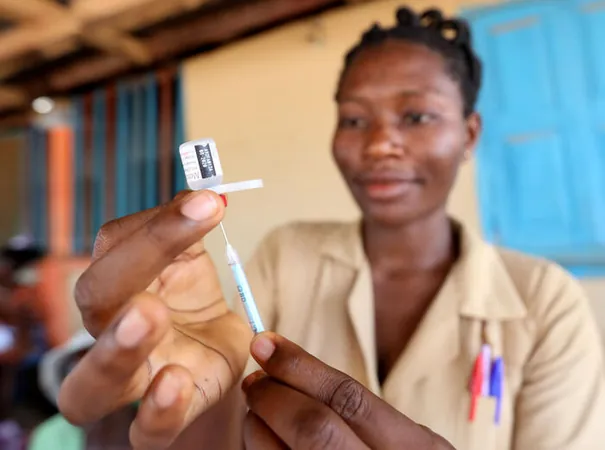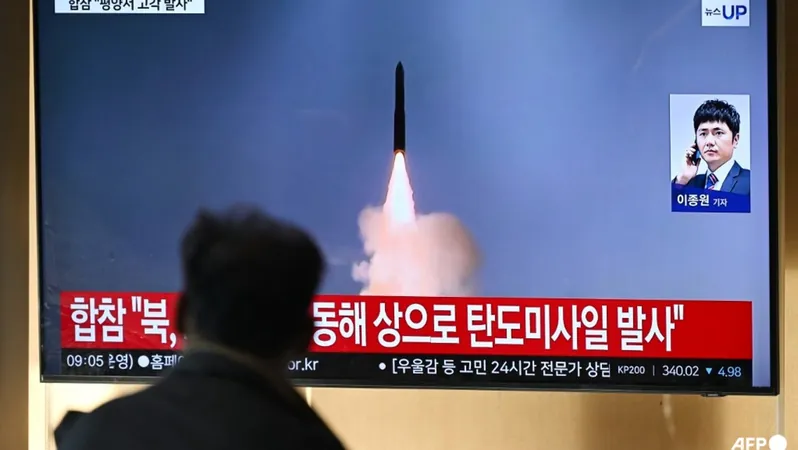
Sudan Launches Historic Malaria Vaccine Campaign for Children
2024-11-04
Author: Ming
Sudan Launches Historic Malaria Vaccine Campaign for Children
In a monumental step towards reducing child mortality due to malaria, Sudan's Federal Ministry of Health, collaborated with UNICEF, the World Health Organization (WHO), and Gavi, the Vaccine Alliance, launched its first malaria vaccine initiative today. This historic rollout is aimed at safeguarding children under the age of one from this life-threatening disease.
The campaign commenced with the delivery of 186,000 doses of the malaria vaccine, which were received in October. Initially, the vaccination drive will take place at health facilities in 15 localities, primarily in Gedaref and Blue Nile states, targeting over 148,000 infants. The program is set to expand significantly in the coming years, with plans to introduce the vaccine across 129 localities throughout Sudan by 2025 and 2026.
Dr. Heitham Mohamed Ibrahim Awadallah, the Federal Minister of Health, expressed optimism: “Today marks a significant milestone as we introduce the malaria vaccine in Sudan. This initiative reflects our strong commitment to combat malaria and protects the lives of our children. Together, we are working toward a malaria-free Sudan.”
Malaria poses a severe threat in Sudan, with the country recording the highest incidence rates in the WHO Eastern Mediterranean Region. In 2023 alone, an estimated 3.4 million malaria cases were reported, resulting in approximately 7,900 deaths, a number that is suspected to be drastically higher due to ongoing conflict and communication breakdowns in the region.
Sudan stands out as one of the first countries in Africa to implement the malaria vaccine, a feat achieved amidst ongoing conflict. Targeting children aged 5 to 12 months, the vaccine aims to significantly decrease hospital admissions and mortality rates related to malaria.
“This vaccine is a critical tool in our fight against child mortality,” said Sheldon Yett, UNICEF Representative to Sudan. “Its integration into the national immunization program presents an enormous opportunity for our health initiatives.”
However, the introduction of the vaccine faces challenges. The ongoing conflict has severely disrupted health services, with vaccination coverage plummeting from 85% to around 50%. In active conflict zones, immunization rates are alarmingly low at just 30%, leaving millions of children vulnerable to preventable diseases like cholera, measles, and malaria.
Dr. Shible Sahbani, WHO Representative to Sudan, emphasized the need for a comprehensive approach. “Despite these challenges, today marks an important victory in our fight against malaria,” Sahbani stated, advocating for the integration of the vaccine with other health interventions.
Led by the Federal Ministry of Health, with support from its partners, the rollout includes well-crafted implementation plans, community engagement, and training for health workers to guarantee that the vaccines remain viable and accessible.
“The introduction of the malaria vaccine represents hope for a healthier future, especially for Sudanese children enduring hardship in these trying times,” said Anne Cronin, Senior Country Manager for Sudan at Gavi.
As Sudan embarks on this critical journey to fight malaria, the successful administration of the vaccine could save countless lives, providing essential protection and hope for a better tomorrow.






 Brasil (PT)
Brasil (PT)
 Canada (EN)
Canada (EN)
 Chile (ES)
Chile (ES)
 España (ES)
España (ES)
 France (FR)
France (FR)
 Hong Kong (EN)
Hong Kong (EN)
 Italia (IT)
Italia (IT)
 日本 (JA)
日本 (JA)
 Magyarország (HU)
Magyarország (HU)
 Norge (NO)
Norge (NO)
 Polska (PL)
Polska (PL)
 Schweiz (DE)
Schweiz (DE)
 Singapore (EN)
Singapore (EN)
 Sverige (SV)
Sverige (SV)
 Suomi (FI)
Suomi (FI)
 Türkiye (TR)
Türkiye (TR)